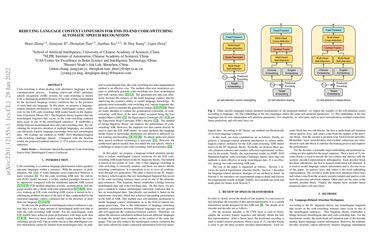Reducing language context confusion for end-to-end code-switching automatic speech recognition
Code-switching deals with alternative languages in communication process. Training end-to-end (E2E) automatic speech recognition (ASR) systems for code-switching is especially challenging as code-switching training data are always insufficient to combat the increased multilingual context confusion due to the presence of more than one language. We propose a language-related attention mechanism to reduce multilingual context confusion for the E2E code-switching ASR model based on the Equivalence Constraint (EC) Theory. The linguistic theory requires that any monolingual fragment that occurs in the code-switching sentence must occur in one of the monolingual sentences. The theory establishes a bridge between monolingual data and code-switching data. We leverage this linguistics theory to design the code-switching E2E ASR model. The proposed model efficiently transfers language knowledge from rich monolingual data to improve the performance of the code-switching ASR model. We evaluate our model on ASRU 2019 Mandarin-English code-switching challenge dataset. Compared to the baseline model, our proposed model achieves a 17.12% relative error reduction.
PDF Abstract

